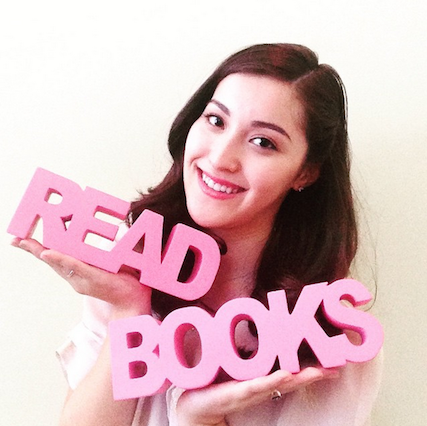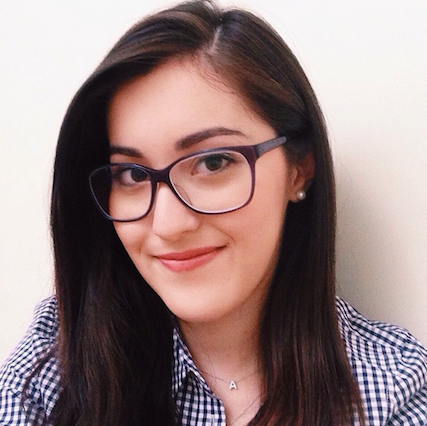BOOKS
Rad Reads
Exclusive: 18-year-old author Anna Caltabiano talks writing, college and more

GL: How young were you when you started writing?
Anna: I’ve been reading for as long as I can remember and writing for almost as long as I can remember; it was just kind of a natural progression. I’ve always loved writing short stories. At first I would write by hand, I would staple the pages together and pass them out to my family. They would probably read three pages and then put it down, but after that my short stories kind of got longer. I remember the first story I wrote was called The Hungry King and it was about a genie who had to tell a king, "You're too hungry, don't eat your people." It was the strangest thing, but I loved writing it. My first novel that I wrote when I was fourteen, but I didn’t really intend for it to be a novel. I thought it would be kind of cool to write a book, but really it was a short story that just kept growing.
GL: And you started that novel when you made a deal with your dad about summer camp, right?
Anna: Yup. I’m an only child and my dad didn’t want me to become a couch potato over the summer. He was always like, “Get out! Do something!” so he was like, "Let's sign you up for soccer camp, let's sign you up for tennis camp, reading camp," just every camp imaginable. I would always dread it because I liked being alone and doing my own thing. It kind of came to the point where I would start slowly dreading summer—I was that kid. So one summer, I told my dad, "Don’t sign me up for summer camp, I am gonna sit down and write a novel." That’s something I’ve always wanted to do, and I wanted to take a crack at it that summer. I’m not sure he quite believed me, but he kind of went along with the idea and he said I could give it a shot. So I sat down at the dining room table and just started writing day after day for the entire summer and that turned into my first novel, All That is Red.

GL: After you finished All That is Red, how did you decide that was something you wanted to get published rather than just a project you made for yourself?
Anna: I think a huge part of that was what the subject of it was all about. In Red the protagonist deals with self-injury, and I wanted to portray that through a fictional lens and the emotion behind it, rather than just the facts and statistics that you can Google. I started writing it because I was so curious about the fact that someone can feel so horrible that they would want to physically hurt themselves to not focus on their inner pain. There wasn’t really a book about the emotions behind it that I could find so I thought, why not? Why not me? At the end I thought maybe this could help someone—if it could help even one person, that summer I spend writing was all worth it.
GL: Was there anyone that you shared the book with before it got published?
Anna: After it was done, I just handed it to my dad. He was definitely depressed about what the subject was about and surprised that I did end up actually finished a novel that summer. My mother is Japanese, and the funny thing is, although we speak Japanese at home, my mother doesn’t read in English. So she’s actually never read anything that I’ve written at all. So after I’ve finished writing, we find time to sit down on the couch and I try to translate everything. It takes like two hours but it’s an interesting dynamic.
.jpg)
GL: Can you tell us about the process was like for you, going from a finished manuscript to a published book?
Anna: After you have your finished novel and after you edit it yourself, you would go through this query process where you write letters to literary agents saying, "Hey, this is what my book's about, here’s a little about me and why I wanted to be the one to write this particular book." Then it’s finding a literary agent who really believes in the story that you want to tell and what other stories you have in case you work with them for more than one book. With your literary agent, you try to find an editor and a publishing house who’s excited about your story as much as you are and from there you start editing your book professionally, you start getting insights from other people, and a copy editor and it gets to proof reading. When you start seeing covers of your book, it's really exciting, and then one day you get a shipped package, and then inside that shipped package is a finished bound, proofed copy of your book. It always just feels surreal. It's incredible.
GL: You're starting college at Brown University this fall. How are you planning on balancing your writing with school?
Anna: I'm hoping to study neuroscience, but I know I'll find time. I'm sure in college many of my classmates will join sports or join theater, plays. They spend many hours practicing what they want to do, and writing is something I love to do. So I know I will always make time for it and I'll have more inspiration around me because I’ll have these interesting people and courses. The way I look at it is that medicine is very people-centric, and so is writing. What better way is there to learn about people then through both of those lenses?
GL: Totally. As a multilingual writer, are there any words words you wish you could use that just don't translate into English well?
Anna: I think English is a very poetic language, it has a lot of words for emotions and feelings and it's so based on the individual, but there's one Japanese word. You'd write it in English like suinki, I think. It's an aura or feeling that a certain person or setting can give off. It's a really amazing word, and there just isn't quite the same thing in English.
GL: Do you have any tips for young writers who are starting out or who hope to write their own novel one day?
Anna: I definitely think that you have to not be afraid to write something bad. If you write something at the end of the day and you read it and you think, "Wow this is terrible, it's never gonna see the light of day," at least you know that your characters aren't supposed to go down that path. You've looked there, you've covered that path, and the next day you can take out your notebook or your laptop and start down a different path with your characters.
What kind of books do you love to read? Have you written any of your own stories? Tell us in the comments and check out Anna's website here.
Photos credit: Anna Caltabiano, HarperCollins/EpicReads
POSTED IN books we love, Authors, GL Exclusive
check these out!
you might like these
-
 EXCLUSIVE! Authors Anita and Giovanna McBride take us on an insider tour of the White House
EXCLUSIVE! Authors Anita and Giovanna McBride take us on an insider tour of the White House
-
 We just found your hidden superpower, thanks to our latest fantastical Bestie Book Club read Unraveled
We just found your hidden superpower, thanks to our latest fantastical Bestie Book Club read Unraveled
-
 How to annotate books with your besties
How to annotate books with your besties
-
 We're setting you up on a Book Blind Date—here's which read is your perf match
We're setting you up on a Book Blind Date—here's which read is your perf match

 become a contributor
become a contributor




.jpg?w=135&h=153&mode=crop)
.png?w=135&h=153&mode=crop)












